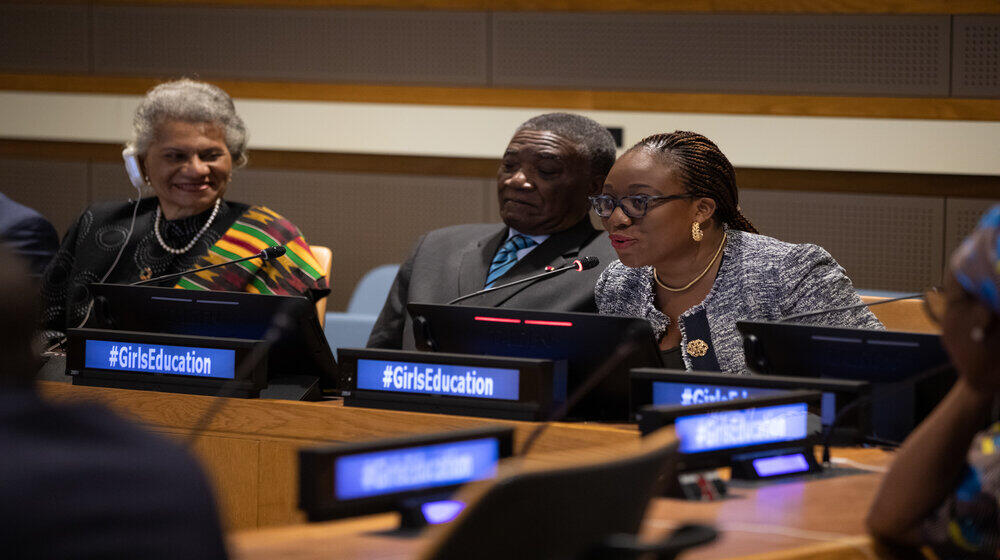
Minister of Women's Empowerment
and the Family attending from the
UNFPA Cameroon Country Office.
Photo: UNFPA
Cameroon, April 2023
Yaounde, Cameroon – 14th April 2023. On the margins of the United Nations 56th session of the Commission on Population and Development, the Government of Cameroon in collaboration with UNFPA, UNESCO and UNICEF, organised a side event to discuss on the thematic "Keeping girls in school in the context of climate fragility: challenges and impact on sustainable development". Discussions focused on gender equality and challenges faced by girls in the northern part of Cameroon in a context of climate change. The objective aimed at identifying and drawing from best practices already implemented in order to develop the full potential of girls through education, health and social protection policies.
The session was held in a hybrid format both at the United Nations Headquarters in New York and at the UNFPA Cameroon Country Office in Yaounde, and co-chaired by Professor Marie-Therese Abena Ondoa, Cameroon's Minister of Women’s Empowerment and the Family and Dr. Julitta Onabanjo, Director of the Technical Division at UNFPA Headquarters. It brought together members of government, directors, representatives of UN agencies, civil society, national institutions in Cameroon and other stakeholders rallied around the cause of the education of the girl child.
Studies have shown that climate change and other environmental crises tend to undermine girls’ prospects for schooling and empowerment. These phenomena accentuate the scarcity of sources of income, leading to poverty, displacement, conflicts, food insecurity and school dropouts, all factors which contribute to the increase in child and forced marriages.
The regions which are most hit by this situation are the Adamawa, North and Far North Regions. Here, three out of four girls are married before the age of 18, according to official statistics. Nationally, the gender gap in secondary education is 6% in favor of boys, with only 42.5% of girls reaching secondary education.
It is this state of affairs which spurred the need for a discussion between the Cameroon Government, its United Nations partners and other stakeholders in a bid to understand the causes and find lasting solutions for the sake of the girl child at risk.

Photo: UNFPA, April 2023
The discussions ended in a series of recommendations to be implemented at various levels including the micro, meso, and macro levels with coordinated action from public, private, and civil society actors. Because progress in girls schooling has so far been geographically and socially uneven, programs must privilege the regions and sub-populations that are lagging, especially when these regions also face severe climate and security threats. In Cameroon, the Northern regions of the country deserve priority, followed by other lagging communities facing severe security threats. Other key recommendations included the construction of school infrastructure especially latrines and school canteens as well as promote digital education and subsidize the cost of girls’ schooling in low-income families.


